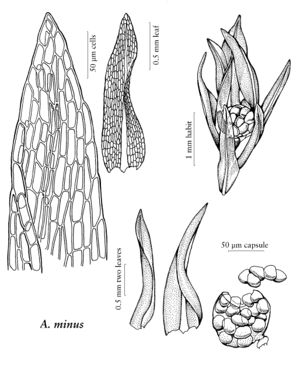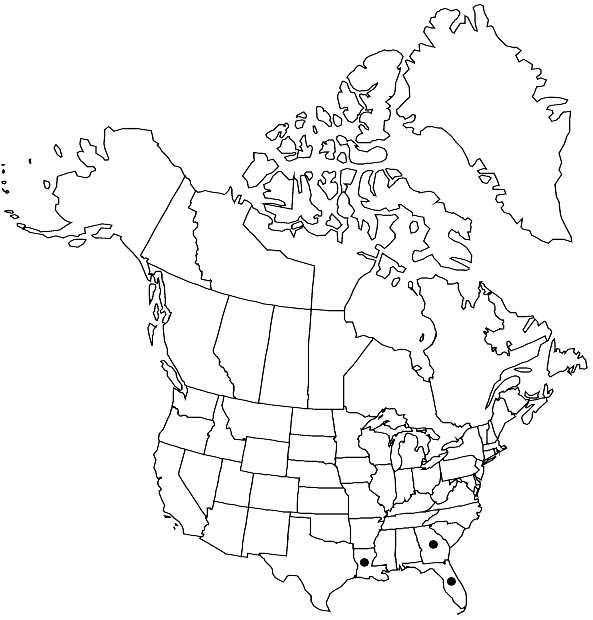Difference between revisions of "Archidium minus"
J. Hattori Bot. Lab. 39: 127. 1975,.
FNA>Volume Importer |
FNA>Volume Importer |
||
| Line 25: | Line 25: | ||
|elevation=0-100 m | |elevation=0-100 m | ||
|distribution=Fla.;Ga.;La. | |distribution=Fla.;Ga.;La. | ||
| − | |discussion=<p>Archidium minus is easily distinguished from other species of the genus by its small size, synoicous sexuality, and the bluntly acute, mostly lanceolate leaves with weak costa. Unlike the other species, it is ephemeral and does not produce the sterile prostrate innovations that give rise to next season’s fertile shoots. It is not closely related to any other Archidium species in North America.</p> | + | |discussion=<p><i>Archidium minus</i> is easily distinguished from other species of the genus by its small size, synoicous sexuality, and the bluntly acute, mostly lanceolate leaves with weak costa. Unlike the other species, it is ephemeral and does not produce the sterile prostrate innovations that give rise to next season’s fertile shoots. It is not closely related to any other <i>Archidium</i> species in North America.</p> |
|tables= | |tables= | ||
|references= | |references= | ||
| Line 49: | Line 49: | ||
|publication year= | |publication year= | ||
|special status= | |special status= | ||
| − | |source xml=https://jpend@bitbucket.org/aafc-mbb/fna-data-curation.git/src/ | + | |source xml=https://jpend@bitbucket.org/aafc-mbb/fna-data-curation.git/src/8f726806613d60c220dc4493de13607dd3150896/coarse_grained_fna_xml/V27/V27_435.xml |
|genus=Archidium | |genus=Archidium | ||
|species=Archidium minus | |species=Archidium minus | ||
Revision as of 16:55, 18 September 2019
Plants minute, 1–3(–5) mm, ephemeral, solitary or gregarious, yellow-green to pale green. Stems mostly simple or sometimes with 2–4 short fertile branches from distal stem leaves, sterile innovations absent. Stem leaves similar to perichaetial leaves but usually smaller, reduced proximally to bracts, erect-spreading or loosely spreading, triangular to linear-lanceolate, acute or broadly obtuse; costa weak, not reaching apex or occasionally absent; laminal margins plane, smooth; median and distal laminal cells of distal stem leaves rectangular, 3:1, 35–45 × 15–20 µm, slightly broader and laxer proximally but not conspicuously different. Perichaetial leaves erect-spreading or loosely spreading, triangular to linear-lanceolate, acute or broadly obtuse; costa weak, not reaching apex or occasionally absent; laminal margins plane, smooth; median and distal laminal cells elongate-rectangular to rhomboidal, 3–5:1, 50–130 × 13–24 µm, distally somewhat smaller, proximal cells rectangular, wider than median and distal cells. Specialized asexual reproduction absent. Sexual condition synoicous, antheridia and archegonia intermixed. Capsule terminal, 350–650 µm. Spores typically 32(16–48) per capsule, 115–175 µm, smooth or papillose, pale green to yellow or yellow-brown.
Phenology: Capsules mature fall to spring (Sep–Apr).
Habitat: Uncommon on moist open sandy or loamy soil, along roadsides and in grassy often disturbed areas, or crevices and pockets in rock
Elevation: 0-100 m
Discussion
Archidium minus is easily distinguished from other species of the genus by its small size, synoicous sexuality, and the bluntly acute, mostly lanceolate leaves with weak costa. Unlike the other species, it is ephemeral and does not produce the sterile prostrate innovations that give rise to next season’s fertile shoots. It is not closely related to any other Archidium species in North America.
Selected References
None.

